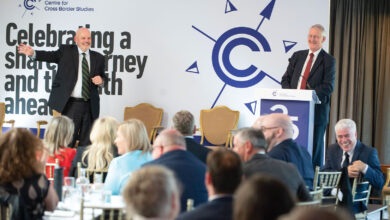Procurement: embracing a new era
As one of the world’s largest commercial law firms, Eversheds, opens a new office in Belfast, Partner Peter Curran discusses the implications of the new public procurement landscape.
Global law firm Eversheds has opened for business in Northern Ireland, bringing an unrivalled depth of expertise on procurement to the local legal scene. As Europe adjusts to the changing face of procurement, Eversheds and its progressive lawyers will be collaborating with public and private sector clients to deliver a unique service and meet their evolving needs.
According to Peter Curran, the partner, who heads up the all-island procurement practice, it is “a time of great change in Northern Ireland and across the EU.”
He comments: “We have the new Directives and in the UK, we have new Regulations implementing the Public Sector Directive. As of 26 February, these Regulations are in force in Northern Ireland and local government, central government and other public bodies are having to get to grips very quickly with it all.”
Much needs to be done on the public sector side to get the house in order and comply with the new regime. “In some respects, the new Directives will change the procurement procedure quite significantly,” he remarks. “In other areas, it will be a case of business as usual. It is important that contracting authorities make the right adjustments to their processes and documentation in order to take full advantage of the new rules.”
The basic idea of the new Directives is to simplify procedures and make them more flexible for all those involved in the procurement process, as well as to promote key social and environmental objectives.
“The jury is still out on whether these goals can or will be achieved under the new framework,” says Curran. He does not believe that, in practice, the new Directives and Regulations simplify procurement law to any great extent.
“The changes are not that radical. There are attempts to simplify certain procedures. For example, the distinction between Part A and Part B services contracts has been removed.” However, in doing so, he says that a new area of uncertainty has been created around those ‘social services’ to which a new light-touch regime is to apply. The law is “as unclear, if not more unclear, than the previous Part B regime.”
Curran highlights this as just one example of where an attempt has been made to simplify things but, in reality, the legal framework is not any easier to understand or adhere to.
“There are quite a few examples of this.” He adds: “Unfortunately for all those involved in procurement, there are many aspects of the law that are still unclear. I think there was an opportunity missed by the legislators in Europe and in the UK to eliminate some of the grey areas.
“On the positive side, they have codified some of case law in areas that are of very real practical significance, such as the extent to which public contracts can be amended, and this is welcome. But again, in legislating in these areas, they open up new areas of doubt and uncertainty. I do not think it will be long before Regulation 72 – which deals with contract modification – gives rise to litigation.”
Another major change is the move towards increased negotiation of contracts. Previously, the negotiated and competitive dialogue procedures were reserved only for the most complex of contracts.
Curran notes: “Now the circumstances in which those procedures can be used has changed, we are going to see more contract negotiation – which some authorities and bidders may welcome – but then again, this could increase risk in other ways. It will be more important than ever to be able to demonstrate that everyone was treated equally in these circumstances.”
Future opportunities
In terms of social and environmental change, the Belfast man believes that “a lot can be achieved through procurement, if contracting authorities have a genuine desire to drive it.”
“There’s so much to be done there. Until now, the public sector has largely played lip service to these issues and has been more focused on achieving cost reductions, value for money or just getting the projects over the line.
He notes: “This is understandable in recessionary times. In order for procurement to go to the next level, there needs to be a change in mind-set, an understanding and an acceptance that it can achieve so much more than just cheap contracts.”
For SMEs in Northern Ireland and across Europe, there is a concern that they miss out on much of the public sector work and that the procurement processes have just become too cumbersome for them to manage.
Curran comments: “The difficulty is that procurement processes are often structured in a way that presents barriers. Often the authorities are procuring frameworks or contracts which are very large and lend themselves more to the larger contractors.”
He adds: “SMEs often find it difficult to compete, particularly for the larger jobs. There are some attempts made in the new Directives to try and address that.”
For example, authorities are now being encouraged to break up their requirements into lots, which may offer SMEs new business opportunities. Self-certification will also allow bidders to notify authorities that they meet the basic selection requirements, thus reducing the administrative burden. “It would only be at the preferred bidder stage, if they are chosen ultimately, that the self-certification would be verified by the authorities,” he explains.
“Of course, it is also open to SMEs to consider forming consortia and relying on the resources of third parties – which they are perfectly entitled to do – and in that way make themselves more competitive for the larger contracts.”
Advice
When asked for his advice to clients, he says that authorities need to have a clear strategy for the procurement from the outset: “Clients need to know what they are procuring and how they are going to procure it. Their documentation should be clear and unambiguous and they obviously need to conduct the process in accordance with the new rules, as well as all the old principles.”
“It’s easy to follow the letter of the law,” Curran comments. “It’s less easy, in practice, to comply with more nebulous concepts of fairness, equality and transparency, which continue to apply to most procurements. Those are the principles that trip people up, and the new Regulations will not change that.”
There’s much that awarding authorities can do to reduce and mitigate the risks but they have to be proactive in adapting their procedures to an evolving legal framework. Simply hoping that you will not be challenged is not a strategy.”
He adds: “Even if an authority has done everything by the book and conducted a very satisfactory process, a mistake by the bidder in complying with the tender requirements can put the authority, through no fault of its own, in a very difficult situation. But that may just be unavoidable. Authorities have to get better at doing the things that are within their control.”
Under the new rules, all key decisions made in the procurement process now have to be recorded in writing, and the ‘progress of the procurement process’ has to be documented. Authorities now have to keep a paper trail of communications and internal deliberations, as well as information on the preparation of procurement documents, on dialogue and negotiations, and on the selection and award processes. This will impose “an added administrative burden” on public bodies and such records are likely to be sought by challengers looking to uncover evidence of wrong-doing.
Curran also maintains that the nature of the Northern Ireland legal system results in more claims reaching the High Court.
“It can be relatively inexpensive to commence litigation in Northern Ireland, compared to England or the Republic of Ireland. Usually the procurement process is automatically suspended once legal proceedings are commenced,” he notes. “So, it is used quite widely as a tactical measure and I think the relatively low cost of taking the initial action has contributed to there being more litigation in Northern Ireland than in other jurisdictions. However, the same substantive issues arise in Northern Ireland as elsewhere, and this is set to continue.”
In conclusion, he predicts: “The new Regulations offer authorities lots of opportunities to improve the way they purchase and advance their own social and environmental policies. It remains to be seen how many of them take full- advantage. It is certainly an interesting time for everybody. At Eversheds, we are we looking forward to helping authorities and bidders alike come to terms with the new regime.”
Public procurement reform principles
• Simple, more flexible rules
• Greater certainty
• Better access for SMEs
• Saving time and costs
• Increasing social and green procurement
• Encouraging innovation and collaboration
Contact details:
Peter Curran
Partner
Eversheds
Tel: 028 9091 8604
Email: petercurran@eversheds.ie





